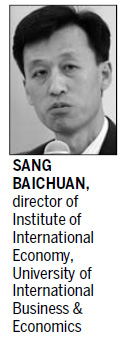Diaoyu Islands dispute a watershed
Bad for economic ties
The dispute over the Diaoyu Islands and the illegal detention of a Chinese fishing boat's captain and crew by Japan after their vessel collided with two Japan Coast Guard ships near the islands have had a negative impact on Sino-Japanese economic relations.

The impact is even worse than before because China's economic standing is greatly different from it was 30 years ago, when it had just started the reform and opening-up.
Because of the global financial crisis, China's development strategy is to boost domestic demand, instead of relying only on exports. It aims to transfer the economic growth mode to reduce the risks of opening-up.
Japan's economic standing is different, too, the most significant of which is related to China's market. Therefore, the diplomatic and political relations are now affecting the economic world more strongly than before.
The deterioration in economic relations has hurt China and Japan both. But Japan may have suffered more, mainly in areas of service and cargo, direct and indirect investment, and regional economic cooperation. In service trade for example, the premise of their development is cultural exchange and people's emotional identity. The Diaoyu Islands dispute has seriously hurt Chinese people's feelings, which in turn has affected bilateral trade.
Travel and technology trade sectors have suffered the most after the incident. If bilateral relations do not improve soon, the travel trade between China and Japan would see a long-term decline. This will deal a hard blow to Japan, for which travel is one of the major growth areas.
In technology trade, Japan's exports accounted for more than 20 percent of China's total technology import. China imports more only from the United States and the European Union (EU).
For one thing, importing advanced technology from Japan is good for the development of China's economy and technical progress. For another, it is obvious that Japan earns huge profits from the trade. After the ship collisions near the Diaoyu Islands, Japan might become more cautious in exporting advanced technology to China, and China will start looking for substitute exporters.
As far as cargo trade is concerned, some adjustments may be made, for example, in government procurement and exports of strategic supplies. China has its advantages in bilateral trade. But if the risks increase and China's consumers change their preference, Japan would no longer be the third largest trade partner of China.
Japan is one of the major countries with direct investment in China. After the Diaoyu incident, the soft environment is a little different, especially the mentality to attract investments, elasticity of investment policy and the relation between labor and capital. The labor-capital relationship has for long been a big problem with Japanese companies in China, and they can face more uncertainties in the future.
In the field of indirect investment, the Japanese currency rose in the past few months. Economists in Japan believe that was caused by China's purchase of Japanese bonds.
But experts in China consider the cause to be the tightening of financial regulations by the US and the EU, which forced hot money to look for new investment hot spots. Another indirect investment issue is fewer Chinese listings in Japan's security market in the future.
Regional economic cooperation is the important factor binding the two sides. But now it seems cooperation will be influenced by the incident and some agenda, such as joint oil exploration, the Asia-Pacific Economic cooperation conference and the establishment of a China-Japan free trade area, delayed.
 0
0 







Go to Forum >>0 Comments